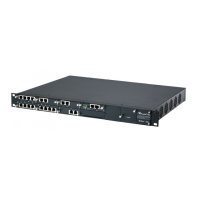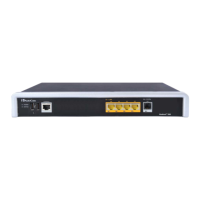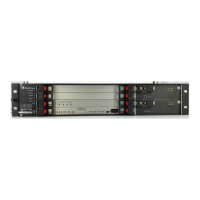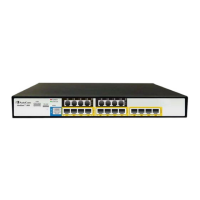SIP User's Manual 202 Document #: LTRT-83310
Mediant 600 & Mediant 1000
Parameter Description
To the Trunk Group's Serving IP Group ID, as defined in the Trunk
Group Settings table.
According to the Outbound IP Routing Table if the parameter
PreferRouteTable is set to 1.
To the default Proxy.
Typically, when IP Groups are used, there is no need to use the
default Proxy, and all routing and registration rules can be configured
using IP Groups and the Account tables (see 'Configuring Account
Table' on page 225).
Proxy Address
[ProxyIp_IpAddress]
The IP address (and optionally port number) of the Proxy server. Up to
five IP addresses can be configured per Proxy Set. Enter the IP
address as an FQDN or in dotted-decimal notation (e.g., 201.10.8.1).
You can also specify the selected port in the format: <IP
address>:<port>.
If you enable Proxy Redundancy (by setting the parameter
EnableProxyKeepAlive to 1 or 2), the device can operate with multiple
Proxy servers. If there is no response from the first (primary) Proxy
defined in the list, the device attempts to communicate with the other
(redundant) Proxies in the list. When a redundant Proxy is located, the
device either continues operating with it until the next failure occurs or
reverts to the primary Proxy (refer to the parameter
ProxyRedundancyMode). If none of the Proxy servers respond, the
device goes over the list again.
The device also provides real-time switching (Hot-Swap mode)
between the primary and redundant proxies (refer to the parameter
IsProxyHotSwap). If the first Proxy doesn't respond to the INVITE
message, the same INVITE message is immediately sent to the next
Proxy in the list. The same logic applies to REGISTER messages (if
RegistrarIP is not defined).
Notes:
If EnableProxyKeepAlive is set to 1 or 2, the device monitors the
connection with the Proxies by using keep-alive messages
(OPTIONS or REGISTER).
To use Proxy Redundancy, you must specify one or more
redundant Proxies.
When a port number is specified (e.g., domain.com:5080), DNS
NAPTR/SRV queries aren't performed, even if
ProxyDNSQueryType is set to 1 or 2.
Transport Type
[ProxyIp_TransportType]
The transport type per Proxy server.
[0] UDP
[1] TCP
[2] TLS
[-1] = Undefined
Note: If no transport type is selected, the value of the global
parameter SIPTransportType is used (see 'Configuring SIP General
Parameters' on page 223).
Web/EMS: Enable Proxy
Keep Alive
[ProxySet_EnableProxyKe
epAlive]
Determines whether Keep-Alive with the Proxy is enabled or disabled.
This parameter is configured per Proxy Set.
[0] Disable = Disable (default).
[1] Using Options = Enables Keep-Alive with Proxy using SIP
OPTIONS messages.
[2] Using Register = Enables Keep-Alive with Proxy using SIP

